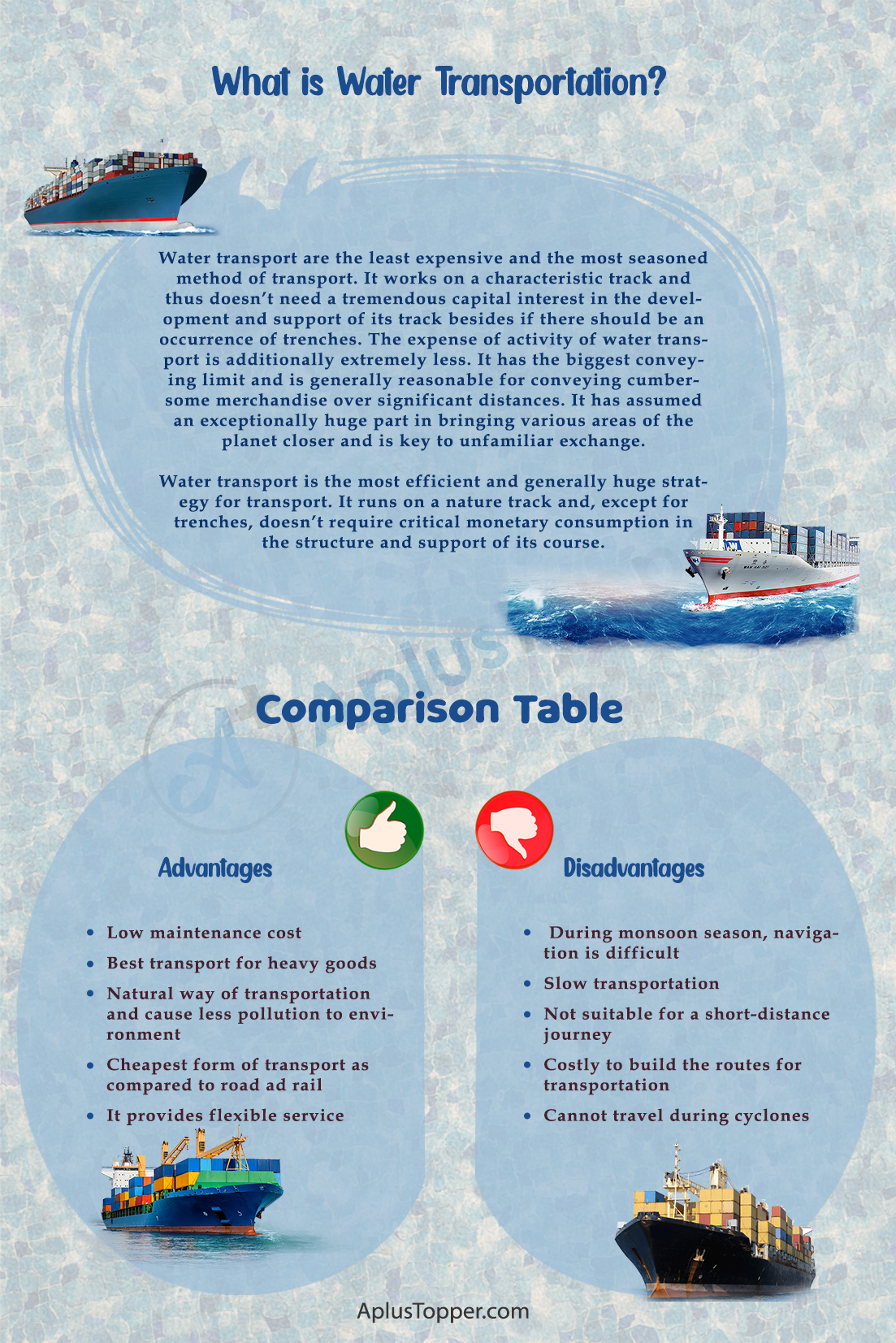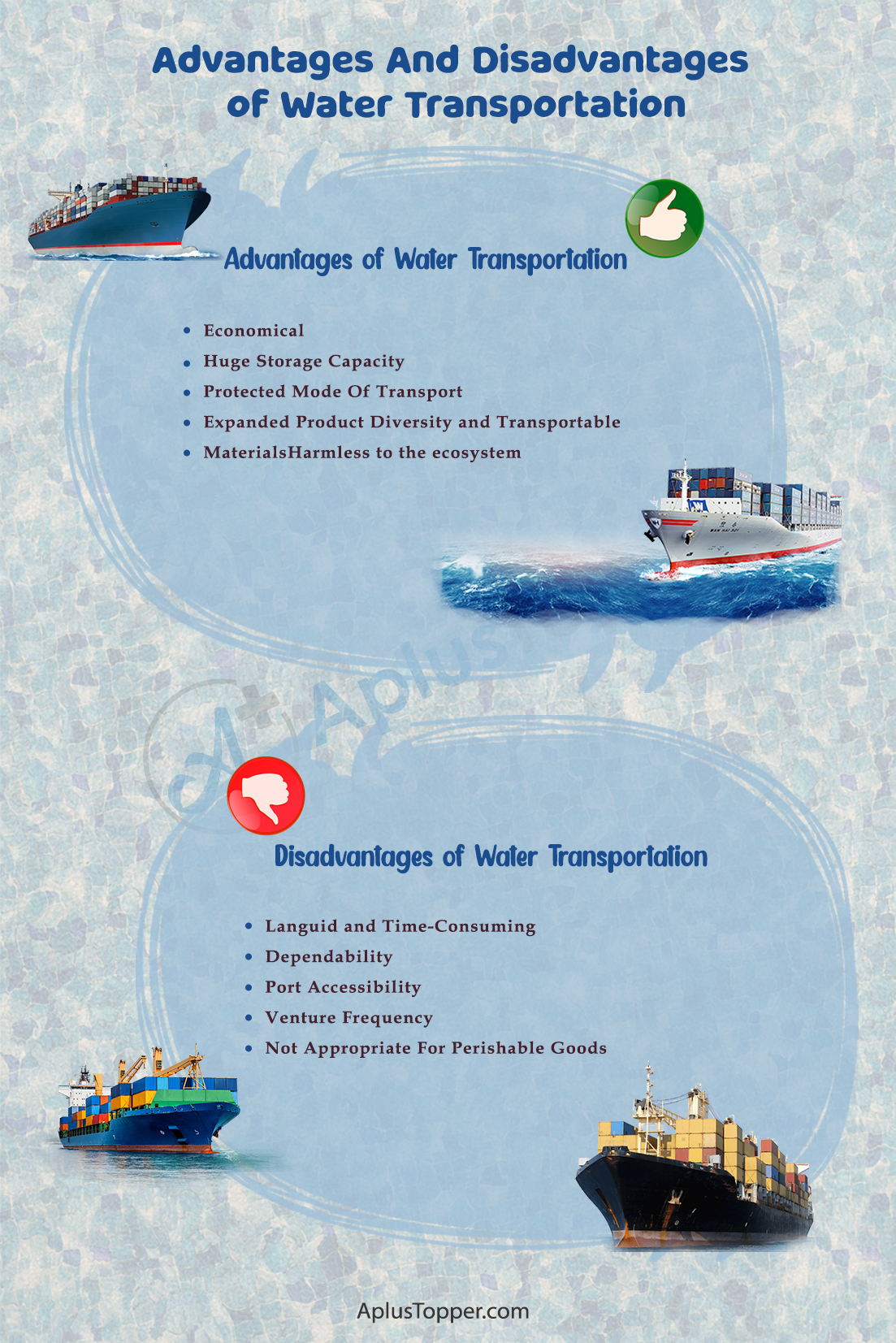Water Transportation Advantages And Disadvantages: Water transportation is depicted as the development of individuals and cargo by boat, boat, barge or boat across sea, ocean, lake, waterway, or stream, or through different methods of water transportation. It is an essential strategy for transportation.
Water transportation is the most financially savvy strategy for moving huge, transitory, and weighty items across significant distances. This technique for head out is fundamentally used to convey individuals, as well as short-lived and durable things together alluded to as freight.
The exchange of individuals, merchandise and everything transferrable by water, are delivered across oceans, seas, waterways, channels, or some other enormous waterways. Despite the fact that waterways have been utilized 100% of the time as a method for shipping things, as of late have trenches turned into a method for moving by water. Seas were additionally a more customary approach to shipping individuals and merchandise. Up until the centre of last century, excursions and cruising makes were utilized to move by seas.
Students can also find more Advantages and Disadvantages articles on events, persons, sports, technology, and many more.
What is Water Transportation? Advantages And Disadvantages of Water Transportation 2022
Water transport are the least expensive and the most seasoned method of transport. It works on a characteristic track and thus doesn’t need a tremendous capital interest in the development and support of its track besides if there should be an occurrence of trenches. The expense of activity of water transport is additionally extremely less. It has the biggest conveying limit and is generally reasonable for conveying cumbersome merchandise over significant distances. It has assumed an exceptionally huge part in bringing various areas of the planet closer and is key to unfamiliar exchange.
Water transport is the most efficient and generally huge strategy for transport. It runs on a nature track and, except for trenches, doesn’t require critical monetary consumption in the structure and support of its course.
Water transport likewise has an extremely low working expense. It has the best burden limit and is consequently the most ideal for shipping tremendous amounts of weighty things across significant distances. It has been instrumental in bringing the world’s numerous locales closer together and is fundamental for worldwide business.
Let us discuss the advantages and disadvantages of water transportation here.
- Advantages of Water Transportation
- Disadvantages of Water Transportation
- Comparison Table for Advantages And Disadvantages of Water Transportation
- FAQ’s on Pros and Cons of Water Transportation
Advantages of Water Transportation
- Economical: Streams are independent street that requires no structure or support. Indeed, even yet, the expense of building and keeping up with channels is a lot less expensive assuming they are used for purposes other than transportation, like water systems. Furthermore, the expense of working water transport is by all accounts exceptionally modest. It is the most economical technique for travel for shipping items between areas. It has a negligible working expense, making it the least expensive method of movement across enormous distances. Huge boats work all the more economically since fuel consumption might be dispersed across a bigger volume. Distance negligibly affects generally speaking travel costs. While street and rail transport have exceptionally high upkeep costs, water transport has generally low support costs.
- Huge Storage Capacity: Ships are the methods of transport that have a higher limit with regards to shipping a bigger measure of merchandise. This is especially obvious when contrasted with different methods of movement like rail, truck, or aeroplane. Water transport empowers the transportation of enormous and weighty things for a minimal price.
- Protected Mode Of Transport: Climate postpones the flight or appearance of a plane a bigger number of times, while boats can work all the more promptly in more intricate or capricious circumstances because of their strength, opposition, and reliability.
- Expanded Product Diversity and Transportable Materials: Considered perhaps the most eminent highlights, we can see how, as opposed to air transport (where, in a few cases, perilous or fluid freight isn’t allowed), the capacity to move a wide range of materials is the main choice with regards to oil, fluids, and hazardous things that planes can’t move. On the off chance that land transport is equipped for stacking such things, it can’t pass them on through intercontinental vehicles.
- Harmless to the ecosystem: Despite the fact that it delivers next to no natural harm, oil spillage from tanks is by all accounts the essential issue with this strategy for transportation now and again. Assuming we need a green world with the least CO2 outflows, water transport will win since it normally has a lower carbon impression. There is an exemption on the off chance that an oil slick is remembered for the examination.

Disadvantages of Water Transportation
- Languid and Time-Consuming: Water transport is a profoundly wasteful sort of transport. Voyaging or shipping things takes an extensive time. Also, waterways are bending. This component should likewise be viewed as while anticipating conveyance dates, since the time required – especially across enormous distances – is frequently more than that needed for air/land transport. Water transport is extremely lazy, making it unacceptable for circumstances when speed is basic.
- Dependability: In spite of the fact that air and land travel is postponed by climate conditions, they all things considered beat water transport as far as on-time appearance. While a one to multi day postponement may not appear to be extreme, it might adversely affect an organization that requires recharging items or has a client looking out for them, bringing about lost income.
- Port Accessibility: On specific occasions, ports are unacceptable for getting freight ships, presenting strategic challenges during disembarkation. All boats require ports and foundations that are proper for their necessities and size; yet, in specific countries, these sorts of offices don’t exist, bringing about postponed conveyance.
- Venture Frequency: This might bring about conveyance postponements or redirections; albeit certain excursions are considerably more business than the others and are frequently made consistently, others might take significantly longer to finish. What’re more boats need more planning time than planes, vehicles, or railways.
- Not Appropriate For Perishable Goods: Water transport is wasteful for conveying short-lived items because of the time span expected to arrive at the objective.
Comparison Table for Advantages And Disadvantages of Water Transportation
| Advantages of Water Transportation | Disadvantages of Water Transportation |
| Low maintenance cost | During monsoon season, navigation is difficult |
| Best transport for heavy goods | Slow transportation |
| Natural way of transportation and cause less pollution to environment | Not suitable for a short-distance journey |
| Cheapest form of transport as compared to road ad rail | Costly to build the routes for transportation |
| It provides flexible service | Cannot travel during cyclones |

FAQ’s on Pros and Cons of Water Transportation
Question 1.
What is water transportation?
Answer:
Water transportation, which is the method involved with moving individuals, products, or whatever else that can be moved by water, is gotten across significant distances on boats, barges, boats, and boats. This method of transportation is viewed as the least expensive sort of transportation.
Question 2.
What are the advantages of water transportation?
Answer:
The advantages of water transportation are:
- Low expenses, with it being the least expensive type of transportation across a significant distance
- Distance not being incredibly added to the absolute of transport cost
- Weighty and mass cargoes are effectively conveyed
- The fuel expenses of enormous vessels can spread in more noteworthy amounts financially
- Water transport has a characteristic course
Question 3.
What are the disadvantages of water transportation?
Answer:
The disadvantages of water transportation are:
- Shipping by water is an exceptionally sluggish method for moving
- Water levels of streams can make route troublesome
- Water transportation is just great for restricted regions
- Streams and channels can’t be utilized as the year progressed, due to the colder time of year climate
- During the late spring, the water level might go down
